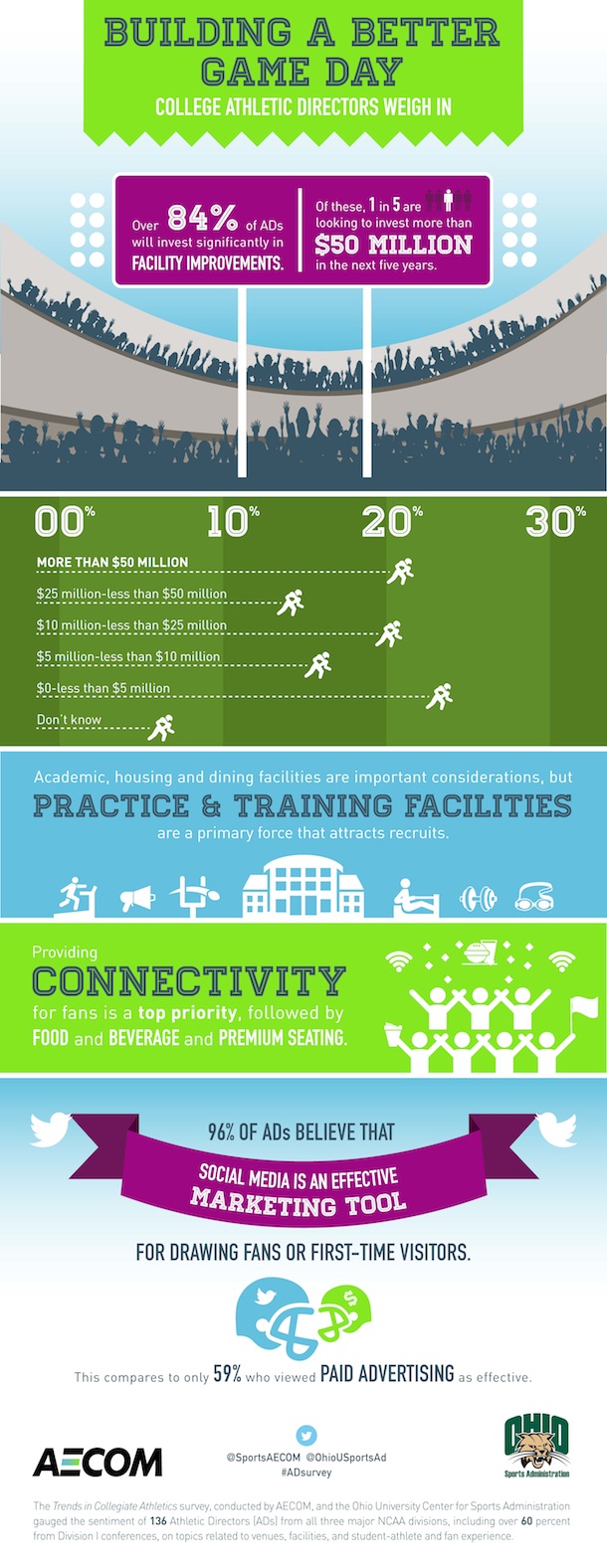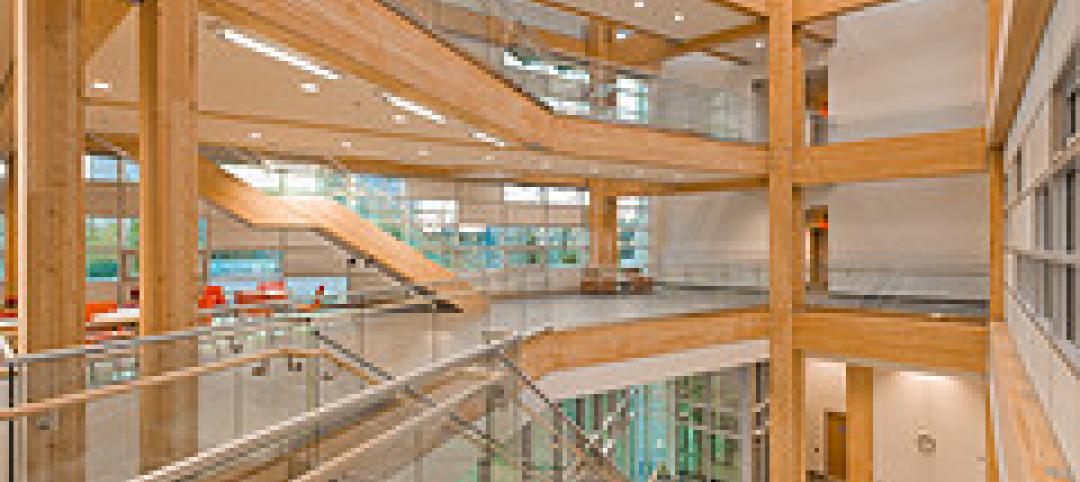According to a survey released today, NCAA athletic directors (ADs) are increasingly focused on enhancing athletic facilities to attract top student athletes and maintain or grow their fan base amidst an extremely competitive environment.
The Trends in Collegiate Athletics survey, conducted by AECOM and Ohio University's Center for Sports Administration, was completed in July-August 2014. The survey gauged the sentiment of 136 ADs from all three major NCAA divisions, including over 60% from Division I conferences, on topics related to venues, facilities, and student-athlete and fan experience.
According to the survey, more than eight in 10 participating ADs plan to make significant investments in facilities over the next five years to target potential recruits and spectators. Of those, one in five plans on spending more than $50 million on renovations and new construction projects. Nearly 95% of ADs are concerned about the funding of their programs.
The majority of participating ADs are investing in upgrades and amenities that they believe will drive game-day attendance and enhance the fan experience, notably connectivity, better food and beverage options, and, particularly at the Division I level, premium seating.
“This survey shows that, as traditional funding streams become less viable, ADs are increasingly focused on fiscal responsibility and making their programs sustainable,” said Jon Niemuth, AECOM Director of Sports, Americas. “One way they are doing this is by investing in upscale amenities, once reserved for the professional level, that will attract fans willing to pay a premium for a unique game day experience.”
“A big issue keeping athletic directors up at night is the funding and performance of their programs,” said Dr. Heather Lawrence-Benedict, Associate Professor of Sports Administration and the AECOM Professor of Sport Business, Ohio University. “ADs are caught in a cyclical pattern—to generate funding they need talented recruits, to attract recruits they need the top facilities, and to build those facilities it goes back to funding. On top of this, they need to appeal to alumni and donors. An unexpected donation, a breakout athlete or a Cinderella season can all be major catalysts for an athletics program.”
To help generate awareness for their upgrades and promote games and game-day activities, the vast majority of ADs (96%) in the study find social media to be an effective marketing tool for drawing fans or first-time visitors to games. That compares to 59% who view paid advertising as effective. Lowering ticket costs was ranked as the least effective option to draw fans by one-third of participating ADs.
ADs are also focused on facility upgrades that will enhance the student athlete experience, and ADs overwhelmingly agree that practice and training facilities are a primary force that attracts recruits, while academic, housing and dining facilities are also rapidly becoming important. If funding was not a factor, ADs would invest heavily in practice and training facilities and locker rooms to appeal to potential recruits.
AECOM and Ohio University’s Center for Sports Administration developed the Trends in Collegiate Athletics through a collaborative effort as part of their ongoing strategic partnership, which began in 2007. The joint effort, which was extended for the third time in 2013, is aimed at educating the next generation of sports business leaders.
To view the full results of the survey, click here.
Related Stories
| Nov 22, 2011
New Green Matters Conference examines emerging issues in concrete and sustainability
High-interest topics will be covered in technical seminars, including infrared reflective coatings for heat island mitigation, innovative uses of concrete to provide cooling and stormwater management, environmental benefits of polished concrete, and advancements in functional resilience of architectural concrete.
| Nov 22, 2011
Suffolk Construction selected as contractor for Boston luxury residential tower
Project team breaks ground on 488,000-sf building that will feature world-class amenities.
| Nov 22, 2011
Jones Lang LaSalle completes construction of two new stores in Manhattan
Firm creates new global design standard serving as project manager for Uniglo’s 89,000-sf flagship location and, 64,000-sf store.
| Nov 21, 2011
Mortenson and enXco partnership to build its 19th wind project
The 8,500 acres project will generate140 megawatts of wind power – enough energy to power approximately 39,000 homes.
| Nov 21, 2011
FDH Engineering acquires Energy Solutions
All ESI employees have been merged into FDH’s staff at its St. Louis office.
| Nov 18, 2011
Centre for Interactive Research on Sustainability opens
Designed to exceed LEED Platinum, the Centre for Interactive Research on Sustainability (CIRS) is one of the most innovative and high performance buildings in North America today, demonstrating leading-edge green building design products, technologies, and systems.
| Nov 17, 2011
SmithGroup changes name to SmithGroupJJR
SmithGroup and JJR join brands to become a single, multi-disciplinary company.
| Nov 17, 2011
Campus-wide energy-efficiency program aims to deliver $3.5 million in energy and operational savings
Merced College and Honeywell will use the school’s energy usage statistics to develop a course curriculum on sustainability, and raise awareness among students of the positive impact conservation practices contribute to the community.
























